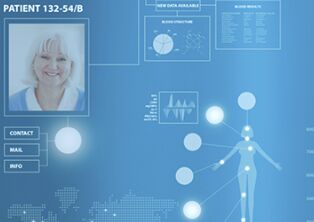新奇APP:医生专用的“专业八卦”?
Figure 1 has made a name for itself as a social network that lets medical professionals discuss photos of patient conditions with colleagues around the world.
作为社交媒体的Figure 1 已然为自己树立了声望,医学专家们可以和全球各地的同行在Figure 1 上讨论病人病情的照片。
“They can learn in real time from other people experiencing and seeing cases,” says Dr. Joshua Landy, a practicing physician and cofounder of Figure 1.
执业医师、Figure 1的合伙创始人约什•兰迪博士说,“他们能实时向其他正在看病例的医学专家学习。”
“If you’re seeing a case, you can take a picture of it, you can describe it and ask for help, and you can even page a specialist.”
“如果你正在看病例,你可以拍一张病例照片,然后描述一下来寻求帮助,你甚至可以传呼一位专家。”

Now, the Toronto company sometimes referred to as the “Instagram for doctors” plans to introduce artificial intelligence into the mix, starting with a feature to turn photos of electrocardiograms into digital data.
现在这家多伦多公司有时候被称作“为医生建立的Instagram”,该公司计划引入人工智能,从把心电图转变成数字资料这一功能开始做起。
The company is planning to formally announce the feature later this month at the International Congress on Electrocardiology in Portland.
这家公司正准备本月晚些时候在国际心电学会上正式宣布这一功能。
At first, experts will be able to weigh in on the meaning of the measurements, but in the future more advanced machine learning systems may be able to provide their own insight into what particular readings mean.
最初专家能够参与到测量意义中,但未来更先进的机器学习系统可能会就病例材料提供它们自己的见解。
Electrocardiograms translate electrical impulses in the heart into line graphs that doctors can read to diagnose patients.
心电图将心脏的电脉冲转变成线型图,医生通过看心电图诊断病人。
While they’re naturally useful in checking for heart attacks and other cardiac issues, experts can sometimes also spot other conditions in ECG readings, from pneumonia to Parkinson’s disease, Landy explains.
兰迪解释说,心电图对于检查心脏病和其他心脏问题当然非常有用,另外专家们有时候也能通过读心电图看出从肺炎到帕金森综合症等其他症状。